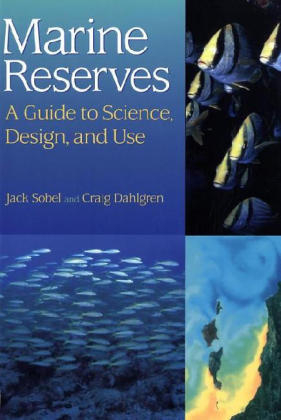
Marine Reserves
A Guide to Science, Design, and Use
Seiten
2004
Island Press (Verlag)
978-1-55963-841-8 (ISBN)
Island Press (Verlag)
978-1-55963-841-8 (ISBN)
- Titel ist leider vergriffen;
keine Neuauflage - Artikel merken
'Marine Reserves' is a guidebook on no-take marine reserves, providing a synthesis of information on the underlying science, as well as design and implementation issues. The book describes the need for marine reserves and their potential benefits.
Conventional fishery management practices have failed to prevent the collapse of numerous fish stocks around the world. Amid growing concern about our ability to protect marine biodiversity and ecosystem integrity, scientists and managers alike are seeking alternative management tools. One of the most promising of those is no-take marine reserves - areas of the sea where all consumptive use of natural resources is prohibited. "Marine Reserves" is a guidebook on no-take marine reserves, providing a synthesis of information on the underlying science, as well as design and implementation issues. The book describes the need for marine reserves and their potential benefits, examines how reserves can be designed to achieve specific objectives, and considers gaps in our knowledge and the research needed to address those gaps.
Chapters examine: marine biological and geophysical issues relevant to reserve design; potential economic and biological benefits of marine reserves, and the likelihood of achieving them; general principles for the design and siting of marine reserves; influence of social and economic factors on reserve design and implementation; and lessons learned from past efforts to establish marine reserves. Also included are four case studies from California, Belize, the Bahamas and the Florida Keys, as well as a review of experiences globally across a broad range of geographical locations, socioeconomic conditions, and marine environments. Case studies provide background on the history of marine reserves in each location, the process by which reserves were created, and the effect of the reserves on marine populations and communities as well as on human communities. "Marine Reserves" represents a valuable guide for fishery managers and marine protected area managers in creating and implementing effective marine reserves, and an accessible reference for environmentalists and others concerned with the conservation of marine resources.
It should also be useful in undergraduate and graduate courses in marine ecology, fisheries, marine policy and related fields.
Conventional fishery management practices have failed to prevent the collapse of numerous fish stocks around the world. Amid growing concern about our ability to protect marine biodiversity and ecosystem integrity, scientists and managers alike are seeking alternative management tools. One of the most promising of those is no-take marine reserves - areas of the sea where all consumptive use of natural resources is prohibited. "Marine Reserves" is a guidebook on no-take marine reserves, providing a synthesis of information on the underlying science, as well as design and implementation issues. The book describes the need for marine reserves and their potential benefits, examines how reserves can be designed to achieve specific objectives, and considers gaps in our knowledge and the research needed to address those gaps.
Chapters examine: marine biological and geophysical issues relevant to reserve design; potential economic and biological benefits of marine reserves, and the likelihood of achieving them; general principles for the design and siting of marine reserves; influence of social and economic factors on reserve design and implementation; and lessons learned from past efforts to establish marine reserves. Also included are four case studies from California, Belize, the Bahamas and the Florida Keys, as well as a review of experiences globally across a broad range of geographical locations, socioeconomic conditions, and marine environments. Case studies provide background on the history of marine reserves in each location, the process by which reserves were created, and the effect of the reserves on marine populations and communities as well as on human communities. "Marine Reserves" represents a valuable guide for fishery managers and marine protected area managers in creating and implementing effective marine reserves, and an accessible reference for environmentalists and others concerned with the conservation of marine resources.
It should also be useful in undergraduate and graduate courses in marine ecology, fisheries, marine policy and related fields.
Jack Sobel is director of the Ecosystems Protection Program at the Center for Marine Conservation. He has played a major role in advancing the concept of marine reserves in the United States and was instrumental in developing the marine reserve in the Florida Keys. Craig Dahlgren is director of research at the Caribbean Marine Research Center in the Bahamas.
| Erscheint lt. Verlag | 6.8.2004 |
|---|---|
| Verlagsort | Washington |
| Sprache | englisch |
| Maße | 178 x 254 mm |
| Gewicht | 723 g |
| Themenwelt | Naturwissenschaften ► Biologie ► Allgemeines / Lexika |
| Naturwissenschaften ► Biologie ► Limnologie / Meeresbiologie | |
| Naturwissenschaften ► Biologie ► Ökologie / Naturschutz | |
| ISBN-10 | 1-55963-841-9 / 1559638419 |
| ISBN-13 | 978-1-55963-841-8 / 9781559638418 |
| Zustand | Neuware |
| Informationen gemäß Produktsicherheitsverordnung (GPSR) | |
| Haben Sie eine Frage zum Produkt? |
Mehr entdecken
aus dem Bereich
aus dem Bereich
Berufsbilder von und für Biologen und Biowissenschaftler
Buch | Softcover (2024)
Verband Biologie, Biowiss. u. Biomedizin in Dtl. e.V. (Verlag)
CHF 23,50
Buch | Softcover (2024)
Wiley-VCH (Verlag)
CHF 55,85
Band 2: Elektrizität, Optik und Wellen
Buch | Softcover (2022)
Wiley-VCH (Verlag)
CHF 55,85


